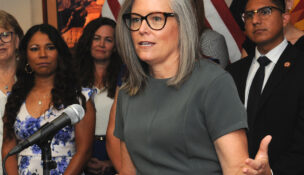Petition to seek limits on medical debt challenged
Camryn Sanchez Arizona Capitol Times//August 12, 2022//[read_meter]
Petition to seek limits on medical debt challenged
Camryn Sanchez Arizona Capitol Times//August 12, 2022//[read_meter]
Healthcare Rising Arizona, a health advocacy group, is pushing a citizens’ initiative that would limit interest charged on medical debt, but Republicans are challenging their efforts,...
No tags for this post.
















